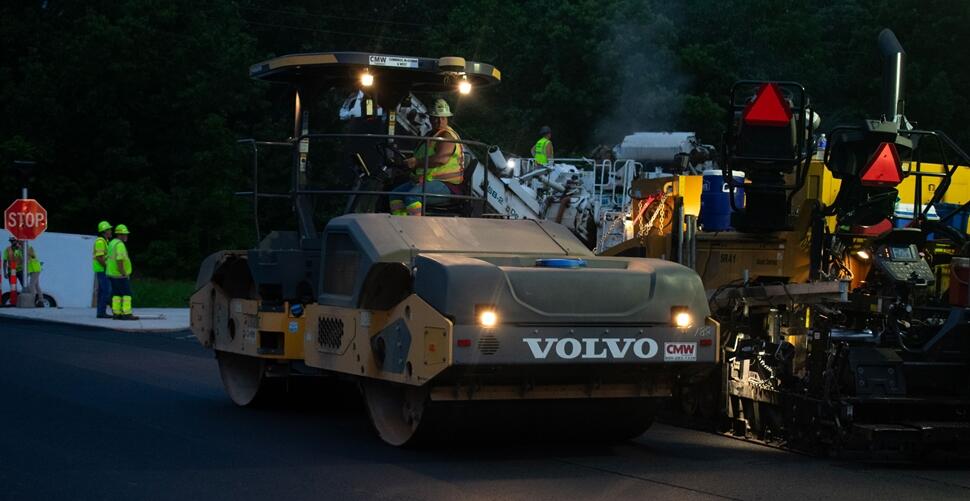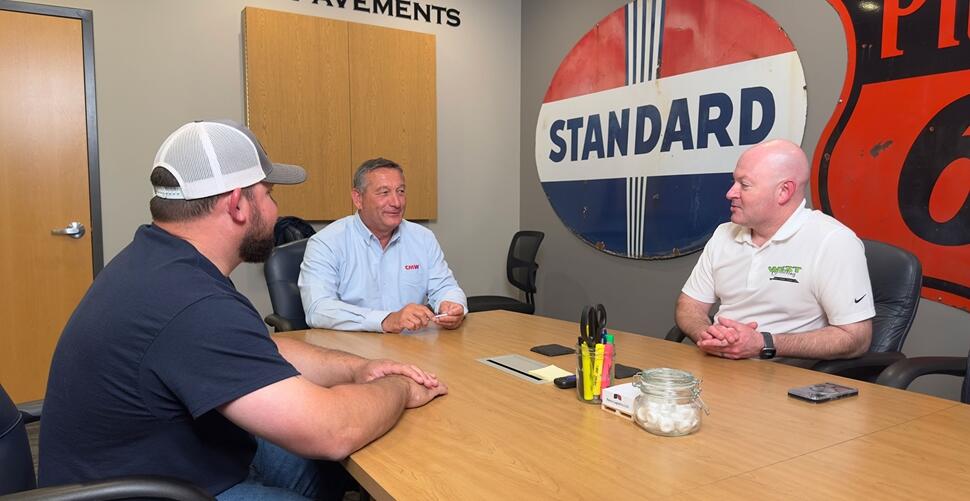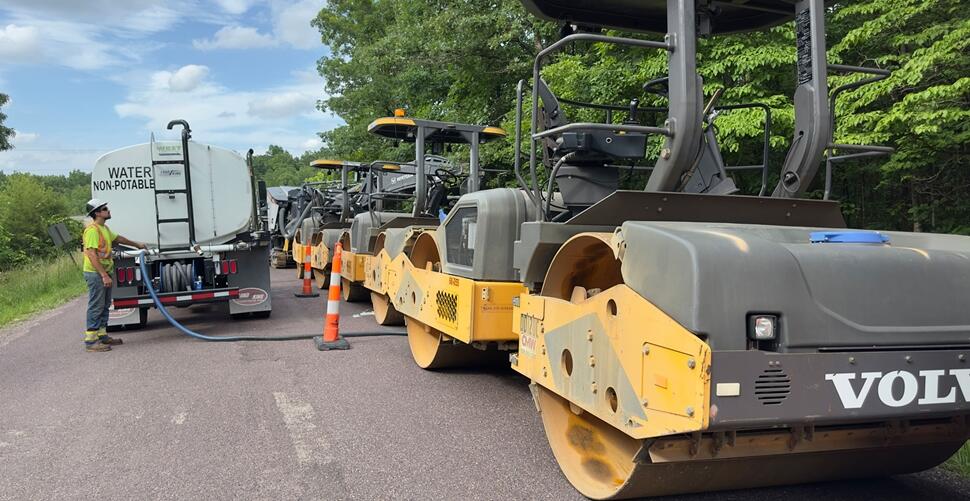Integrity and Technology Keep Missouri Road Crew on the Expressway to Success

Norman and Mary West established the company after President Dwight D. Eisenhower signed into law the Federal Highway Act of 1956, which authorized the construction of a 41,000-mile highway system. In its early years, West Contracting took on small-scale paving projects like driveways, parking lots and subdivisions. In the 1970s, they purchased a quarry about 70 miles southwest of the city and installed an asphalt plant at the site.
Their son, Larry, took over in 1996; and as the metro area’s footprint broadened, so did the company’s capabilities. Today, West Contracting is well known in the region for tackling complex highway projects that serve thousands of daily commuters.
“In this town, anyone that knows our industry knows our name,” says Chris West, Larry’s son and the company’s third-generation president. “We have an outstanding reputation, and I’m proud because it’s taken a long time to build that reputation.”
So what does Chris attribute this success to?
“There are many keys to our success, but first and foremost, it starts with hiring the right people — whether they’re in the field, at the plants or in the office,” he says. “There are at least 10 or 12 different families that have had multiple generations or other family members work here.”
Like his father and grandfather before him, West believes that hiring for character rather than skills is the best way to go.
“There are people that we know may not have the full capability that day when we hire them, but we are happy to train them based off of their values meeting our values,” he says.
One thing that makes training employees easier and faster is technology — especially intelligent compaction technology on their asphalt compactors.

Data in the Driver’s Seat
A growing number of states include intelligent compaction (IC) specs or strongly recommend the use of this technology on highway projects. The Missouri Department of Transportation (MoDOT) has gone a step further and now mandates it, including infrared thermal profiling. These are called “IC-IR” jobs for short.
“There are very specific targets on what we have to do,” explains West. “Thickness laid. Density of the mix. Smoothness of it.”
That’s why his crew trusts asphalt compactors and intelligent compaction solutions from Volvo Construction Equipment. Specifically, they use Volvo’s advanced IC system called Compact Assist with Density Direct™.
This means their asphalt rollers include technology that virtually connects them and provides data to ensure that teams achieve proper asphalt compaction. With the help of GPS, cameras and sensors, operators can see on a screen where they have been, the temperature of the mix and its current density.
A color-coded pass map makes it easy to see what they need to do and when to move on so as not to over-compact the material.
“Over the years, there’s never been a question that we won’t get our density numbers with Volvo and their compactors,” West says. “The IC-IR on them is very easy to operate and pull information off of.”
Not only does the technology help West Contracting achieve high-quality work and provide data as proof, but it also helps train newer operators.
“When you’re working at night, it can be very difficult to see your rolling pattern. If you’re not experienced and you don’t have a camera on there, you may miss a portion of a pass,” explains West. “Having the IC system on these rollers is really helpful in teaching the younger generation.”
Integrating IC-IR technology into their compaction fleet has been nearly as smooth as their finished roads, thanks to relationships at their dealership: CMW Equipment.
“This IC system speeds up the process and allows them the opportunity to put a more inexperienced operator in the seat and not worry about the performance that they’re going to get,” says Lee Newton, vice president at CMW Equipment. “Volvo has one of the best IC systems in the market.”
Nick Brewer, who manages the West Contracting equipment shop, says the quality of Volvo machines and technology is the reason his team relies so heavily on them.
“We chose Volvo equipment specifically because of the results we were achieving with those rollers — specifically, the compaction and density numbers,” he explains.
And his operators appreciate that choice.
“Using the intelligent compaction makes the job a lot easier because it shows you your passes,” says Spencer Dyer, who hauled material for West Contracting for a few years before becoming a compactor operator in 2024.
“It gives you a color grid, how many times you’ve hit it, how wide you’ve gone over it. Last night, we dealt with heavy fog. The intelligence grid made it a lot easier, so we weren’t missing anything.”
The visualization gives West — and the entire team — confidence that they can meet MoDOT’s minimum compaction density requirement of 92%.
“Every night, you may have one, two, three different cores that measure your actual density of your mix,” he says, referring to the cylindrical samples that get pulled out to assess and ensure structural integrity.
“Density Direct helps us stay consistent with those, so our operators know after they have seen on the screen that the compaction is roughly 92 or 93 percent. They all are communicating with each other on our target for the night. It could be 94 or 95. But when they get up to that number, they will move down the road.”

Long-Standing Relationships and Reliable Rides
But what is a great technology solution without a great machine to do the work? That’s where equipment choice comes in, and the West Contracting–CMW Equipment relationship makes the decision process easy.
“It’s simply a matter of looking at their jobs and their specifications and seeing which type of roller would best fit their needs,” says Newton.
His knowledge of those details runs deep: Newton met Norman and Larry West early in his career, has handled their equipment needs for decades, and helped Chris’s team navigate the early days of MoDOT’s IC-IR adoption just a few years ago.
The rollers that West Contracting leases or buys most often are Volvo’s DD120C and DD128C double-drum asphalt compactors. Newton says these models’ 79-inch-wide drums allow an appropriate overlap of passes for highway work. The crews use these 12-ton rollers in the breakdown position, which means it’s the first roller behind the paver and the first to work on freshly laid hot mix asphalt.
“They have eight amplitude settings, so because you can adjust the amplitude based on your mix design and hit it as hard as you need to, it gives a lot of variability,” Newton explains. “Also, you have an impact meter, which essentially links the speed of the roller with the vibration frequency so that you won’t overrun.”
As the person in charge of hundreds of machines, Brewer values the compactors’ reliability.
“We’ve noticed a lot of durability advantages on these newer-model Volvos. They’re going basically that whole 500-hour service interval without us having to touch them,” he says. “There’s a dual spray bar, so that gives you a backup spray bar, a backup full set of water tips and a backup water pump. where if you encounter issues with the primary during operation, you’re able to switch to that secondary spray bar until the end of the shift or until the time presents itself to take care of those issues.”
He appreciates the added peace of mind that comes with the machines’ standard CareTrack telematics system too.
“One of the biggest challenges I face to keep our fleet operational is communication. Volvo and CMW have been huge in that with their factory telematics. A lot of times, they’re aware of an issue before I even know that it exists. That helps me out as a shop manager a lot.”
Even one of the company’s newest operators prefers Volvo compactors.
“As a beginner, I’ve had an easier time with the Volvo than I have any other roller. It’s easier to steer. The seat’s a little more comfortable.” says Elijah Buchanan, who has run rollers for just a few months. “The controls are easier. On other rollers, sometimes it’s a little more complicated. The Volvo keeps it simple.”
In addition to having the right machines and technology, West also attributes their quality results to talented teams who design up to 30 different mixes per asphalt plant location.
“Everything on a compaction job has to do with the mix,” he explains. “Our QC department makes very easily compactible mixes, which helps out because there are certain situations where fluctuations in temperature or moisture or whatnot can make it nearly impossible to get your numbers.”

Paving the Way for Generations To Come
“We perform concrete work, we do some bridge rehab work, we have a little bit of sewer work. Over the years, we’ve added on services to make ourselves more vertically integrated,” says West. “My hope is to continue that and invest in things that make us more competitive.”
To keep this momentum, West knows he will need to keep finding good people.
“There’s a lot of very good knowledge that unfortunately is retiring here,” he notes. “And people underestimate the sacrifices I think people in our industry make to show up to work when they maybe don't know when they're coming home or if they're going to make dinner with their family. It's a difficult industry to work in.”
West says the company is honest with candidates and new employees about what the job demands, but they believe it balances out with robust training, quality equipment, helpful technology, a team that quite literally is like one big family, and great paychecks during busy seasons.
“It makes me happy to see people refer others in their family because they trust us to take care of that person,” he says. “We even have some fourth generations here.”
Carrying on his family’s legacy, continuing to grow a successful business, and providing good jobs for many other families in the St. Louis area … It’s what West has envisioned since he was young.
“My dad asked me at a very early age — I was 13 — if I ever wanted to run the company,” he recalls. “I said yes, and I think the next day he put me to work. The summer of '96. I still have the tax documents.”